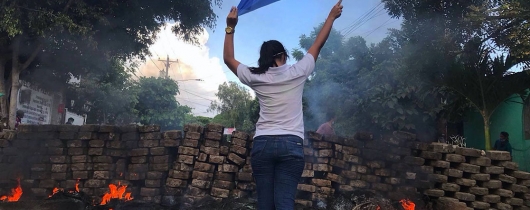Struggle in Nicaragua

Capuchin Bishop of Siuna reflects on the recent violence and the Church’s efforts to address the conflict
By David Zywiec, OFM Cap.
About seven weeks ago, a turning point in Nicaragua's history took place. Before April 19, 2018, Nicaragua was seen as the most secure country of Central America – a good place to visit as a tourist and a place to invest. But in the middle of April the government decided to change some things with the Social Security system here: increase the money people had to pay in and reduce the pensions of retired people. That was the spark that started this whole "unrest." Some university students in Managua decided to march protesting this decision. Riot police were sent in, and students were injured and killed. Other university students rose up and more were injured and killed. The violence has been centered in the capital, Managua, but there have been marches and violence in other cities on the Pacific side of the country. As of June 2nd, there have been some 100 people killed in the violence, over 400 wounded and an unknown number of people missing.
Because of this violence, we ten bishops of the Nicaraguan Bishops Conference have issued a number of messages and had emergency meetings. How do we stop the violence? One way we opt for is a dialogue between the different sectors of the country and look for consensus. The president and the vice president invited the episcopal conference to be involved in this dialogue. We accepted to be witnesses and moderators. In other words, we are there to work for a consensus among the participants. We do not make the final decision like a referee nor are we capable of obliging the different sides to comply with the decisions that have been approved by the group. Cardinal Brenes, the archbishop of Managua, heads the mediation group of 5 bishops. In our meeting of May 14, we decided to convoke the national dialogue, with the first plenary session on Wednesday, May 16. Bishop Paul and I were at that session with the other eight bishops.
What's the root of all this violence? Just social security? The government decision and the overreaction of the police opened a kind of Pandora's box of a lot of hidden frustrations: election frauds, corruption on different levels of government, control of all branches of government by a single political party, to name a few. So, in this dialogue, there is an opportunity for different sectors to express themselves: students, farmers, ranchers, business people, civil society, Pentecostal churches, and the Atlantic Coast together with representatives of the national government. Together there are a little over 50 people in this dialogue.
Most of the violence has been caused by the national police and people affiliated with the party in power. But that's not to say that some police and militants of the government party have been killed or injured. The tragic part of all of this is that most of the people killed, injured or missing have been young and unarmed. And practically no one has been brought to trial. The government blames the opposition, and the opposition blames the government. As if the accusing side has been born without original sin and the other is possessed by the devil!
How is all this affecting the two dioceses, Bluefields and Siuna, on the Atlantic Coast, where your two brother Capuchins are? We have had marches both in favor and against the present government. They have been peaceful and with no police brutality. Some youth from our dioceses have been killed, but these were in Managua. One reporter was shot and fatally wounded in Bluefields some weeks ago. That's the only fatality that has occurred in the area.
Our big problem is roadblocks. As a form of protest, people have set up roadblocks on the main roads. These are arteries that bring in food, medicine and other goods from Managua. At the same time, trucks take out milk and cattle to the Managua or Pacific side of the country. All this is either slowed down or paralyzed. So, in a lot of places people are running out of work and things like gas to cook with, medicines, sugar and other foodstuffs.
When is all this going to end, and how is it going to end? Only God knows. Last week the plenary session of the dialogue had two motions to be voted on. Neither one had consensus. So, plenary sessions were put on hold, and a group of 6 was formed to help get the dialogue going again. But Wednesday, May 30, is Mother's Day here in Nicaragua. In Managua, a march was called in support of the mothers whose children were killed in the violence. It was peaceful, and thousands came out for the march. But it was attacked by sharpshooters, and more unarmed people were killed. When this is going on, one cannot have credible dialogue.
The Organization of American States is getting involved in this situation. They have a plan for calling elections next year – ahead of time. However, some people trust the OAS and others don't. And, in a kind of war situation, it's easy to think black and white: these people are with us and these people are against us. Pastorally and spiritually it is a challenge to place following Jesus first before any political option. Also, to realize that violence is not the solution to problems. And there will be a lot of reconciliation to be done in the future. Brothers and sisters, I hope this gives you a little idea of what we are going through here in Nicaragua. And I'm sure we can count on your prayers: that "Thy Will be done on earth as it is in heaven".



